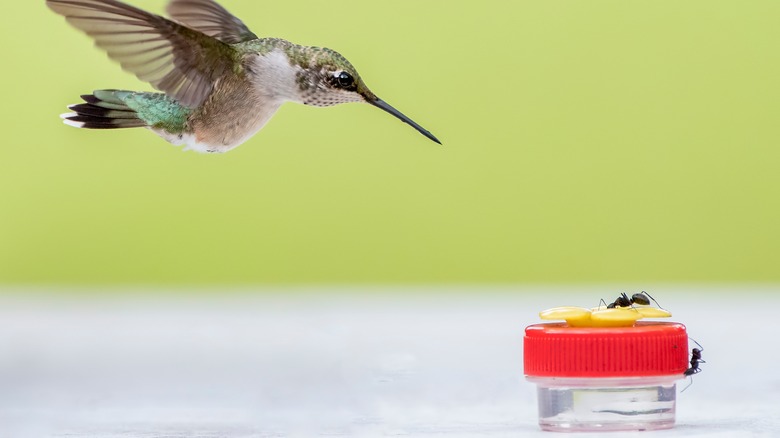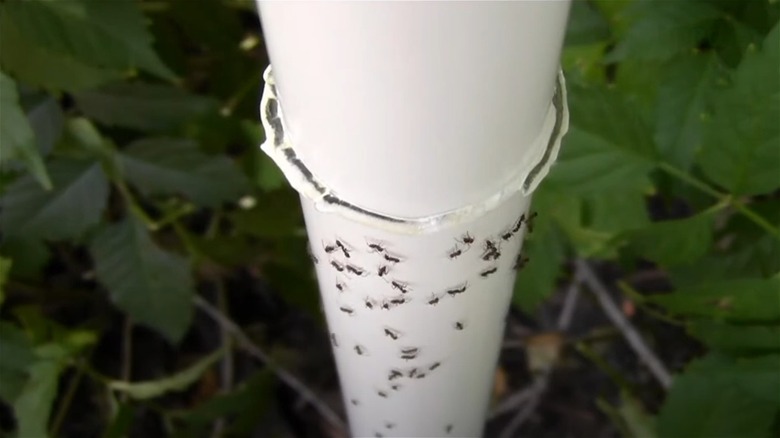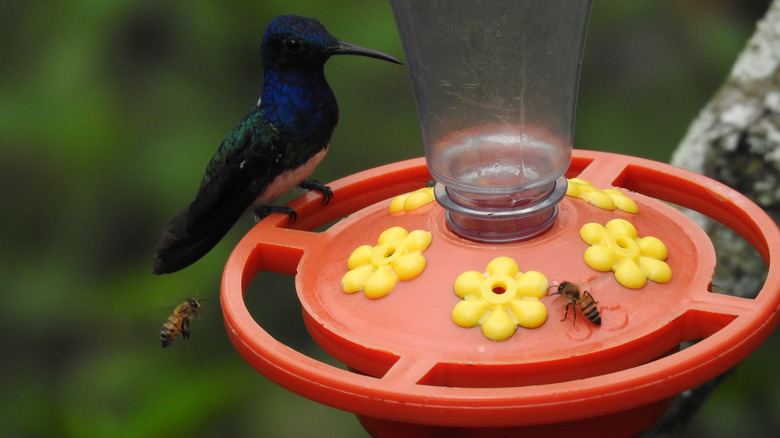Can This Powerful Product Really Keep Ants Out Of Your Hummingbird Feeder?
We may receive a commission on purchases made from links.
Hummingbirds are one of the most fascinating backyard birds to watch, and many people eagerly greet their return in spring and summer with a fresh, sugary feeder. Unfortunately, hummingbirds aren't the only ones who like sticky, sweet stuff, and it's often only a matter of time until the ants come marching in. Ants have up to five times more olfactory receptors than other insects, allowing them to detect food from far away and move in quickly. Once one ant discovers your hummingbird feeder, it'll leave a scent trail for other ants to follow, and soon, your feeder could be plagued by the aggressive little bugs. If they're not controlled, ants can contaminate the water by drowning inside or even injure a hummingbird's delicate tongue. Luckily, Nectar Fortress by Sapphire Labs is a simple and safe product that may solve your ant troubles for good, and can be purchased at many garden centers or on Amazon for under $15.
The battle between ants and hummingbird enthusiasts is a tale as old as time. You may have gone so far as to make your own ant mote to keep pests out of your hummingbird feeder. But Nectar Fortress is a simple, natural, and highly effective gel solution that's much easier to use. At the same time, it's totally safe for the hummingbirds and other living creatures in your yard. Here's how Nectar Fortress works and the fascinating science behind its ant-repelling powers.
Nectar Fortress is an invisible ant shield
Nectar Fortress, designed by Sapphire Labs, is a clear gel that acts as a barrier to ants by blocking their path and repelling them from the area. What's inside this seemingly magical tube of gel? According to Sapphire Labs, Nectar Fortress uses natural cinnamon oil as an active ant-repellant. It might sound surprising that you could repel ants naturally with this common kitchen ingredient, but cinnamon contains chemicals that are bothersome and even toxic to ants. "The primary ingredient in cinnamon that might agitate ants is cinnamaldehyde," says Ismael Girard, CEO of Pest Agent (via Martha Stewart), "This substance tampers with ants' pheromone trails, making it harder for them to navigate toward their food sources or return to their colonies. Ants find the 'smell barricade' it creates uncomfortable to cross."
Unlike other ant-repellent methods, such as an ant mote, which requires frequent fussing and refilling, Nectar Fortress is a squirtable gel that only requires one application and is designed to last all summer! Each tube contains enough gel to protect as many as ten hummingbird feeders. Simply unscrew the tube cap and squeeze the gel in a thin line around your porch post, feeder pole, or hanging line, ensuring that there aren't any gaps. As soon as the ants come close enough to touch it with their sensitive antennae, they'll bolt away from the line of gel!
Is Nectar Fortress safe?
Some people might worry about how the active ingredients in Nectar Fortress might affect hummingbirds and other wildlife, but Sapphire Labs claims that the concentration of cinnamon oil in Nectar Fortress is low enough that it won't cause any irritation to birds. The other main ingredient in Nectar Fortress is oleic acid, a fatty acid that birds naturally produce and use while preening their feathers. Once it dries, the gel firms up, so it won't be sticky or messy, but if a bird were to rub up against it, any oleic acid picked up would simply blend in with the bird's natural preening oils.
This innovative product is one of the best natural ways to get rid of ants without poisons, preventing them from marching up the pole and into your hummingbird feeder, but does it repel flying insects like bees, wasps, and yellowjackets, too? Yes! Applying the Nectar Fortress gel to the underside of the feeder has been shown to harmlessly repel these insects from the hummingbird feeder with its strong cinnamon scent. Deterring bees and other insects allows the hummingbirds to enjoy the feeder safely without harming these important pollinators.


